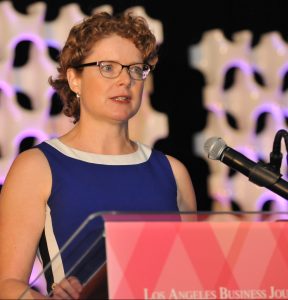
The following is adapted from a speech given by Donella at the Los Angeles Business Journal’s Women’s Summit on May 23, 2016 (GHJ was a sponsor). Donella is Board President of the Downtown Women’s Center, the only organization in Los Angeles exclusively dedicated to addressing the needs of women overcoming poverty and homelessness in Skid Row.
Something very exciting happened earlier this year. The Los Angeles Homeless Services Authority Homeless Count numbers were released on May 4, and for the first time ever, women were specifically called out.
This is significant because the data for women has never been distinguished or disclosed in this report before. At the Downtown Women’s Center, we believe that a gendered point of view is essential to informing research, policies and practices that aim to end homelessness, so I can’t tell you how excited we are that homeless women are finally being seen and counted in this way. It is a major step in our goal to focus City, State, Federal and philanthropic attention on women and their unique needs. We know that we will only see a decrease in women’s homelessness when there are services targeted towards the specific needs of women.
And why did it take so long? That’s a good question. The fact that it has finally happened is due to the tireless advocacy by the Downtown Women’s Center, working with officials from the City, County and the Los Angeles Homeless Services Authority.
Further evidence of the effectiveness of these advocacy efforts is that the budget approved last Thursday by the Los Angeles City Council sets aside $138 million to provide 600 units of housing and countless services for the homeless. While this is great news, we at the Downtown Women’s Center are especially excited that our two budget asks were included in the budget – one of the few provider asks that made it through! They were The Housing Gap Analysis and Trauma Informed Care for City services.
There are three messages I’m hoping to convey: the importance of being bold, of being an advocate, and of knowing what you stand for — because women count; women are not invisible.
Being Bold
It takes courage to create change. At the Downtown Women’s Center, there is a woman (two women actually) who made a significant difference in a male-dominated community.
Rosa was born and raised in El Paso, Texas. When she was 18 years old, she and her sisters left Texas on a train bound for Los Angeles, hoping to find broader job opportunities than their hometown afforded. Rosa cleaned homes and cooked for several families in Los Angeles but increasingly experienced signs of mental illness, which interfered with her ability to work. Rosa was in and out of psychiatric hospitals as her symptoms grew more severe throughout her 20s. Ultimately, the closure of these state run facilities left her, and thousands of others, on the streets in the mid-1970s.
Despite her adversity, Rosa’s exceptional resourcefulness aided her in building a life for herself on the street. It was very important to Rosa to remain clean; and so she created a bathing ritual that started with filling her pails with water from a city faucet and leaving the water to warm in the sunlight. She propped cardboard up around the perimeter of her shopping cart for privacy and inside the cart sat on her milk carton “chair” to bathe with the warmed water in her pails. At night, Rosa laid her cardboard down for friends to sleep on in exchange for their promise to watch out for her. One of Rosa’s pleasures was cooking for her circle of friends on Skid Row using a stove she fashioned by placing bricks over a fire.
Jill Halverson, the founder of the Downtown Women’s Center, was a social worker in the Downtown community. In 1975, a group of men with whom Jill had been working introduced her to their friend Rosa. Jill visited Rosa in the parking lot where she had settled, stopping by to say hello or chatting over coffee. Jill saw in Rosa a bright, loving, interesting woman with a keen sense of humor who persevered despite being unable to sufficiently fulfill her basic needs of cleanliness, safety, and shelter. Deeply moved by Rosa, Jill decided to use her own savings, which she had set aside to purchase her own home, to establish a different kind of home, instead — the Downtown Women’s Center. Not only did Rosa’s courage inspire Jill to be fearless and found a Center for women in need, it inspired thousands of other women on Skid Row to get help as well.
We can all be bold, like Rosa and Jill.
Being an Advocate
Back to the Homeless Count: of course it’s good news in terms of awareness and data for women because data is power. But not good news in what the numbers tell us. We now have over 14,000 women in Los Angeles county experiencing homelessness — a 55 percent increase since 2013.
Though the increase in women experiencing homelessness is disheartening, the Homeless Count also demonstrates an encouraging success story — veteran homelessness decreased by more than 30 percent. Among women who are veterans, homelessness fell by 54 percent, and we at the Downtown Women’s Center are thrilled to be a part of that progress through our work with the Department of Veteran Affairs.
This overall drop in veteran homelessness is a clear result of strategically investing resources in reducing homelessness for a specific population. Now, the next step is to direct local, state and federal resources toward ending homelessness for all women, a population that comprises 33 percent of the total homeless population.
Women have different reasons for becoming homeless than men do; they often end up on the streets due to trauma, domestic violence, economic disparity in the workplace, or an expensive health crisis. To cut down on the rates of women experiencing homelessness, we must first meet these needs with services that empower women through choice, safety and rebuilding trust.
Although the Downtown Women’s Center has been a pioneer in providing these services, the new ability to count and track women in a better way means we can shine an even brighter light on these needs and their solutions. We’re confident that when people see the difference they can make for homeless women, it will lead to real change, just like it did for homeless veterans.
An interesting observation (which is based on the work of Drs. Suzanne Wenzel and Harmony Rhoades at the USC School of Social Work) is that women, after they have attained housing, are much more likely to report giving back as a life goal when compared with men.
And so we should do the same. When we achieve success, we should want to help others, as well. We should support one another. The women in my Firm attended the LABJ Women’s Summit — not only to be inspired by all the speakers — but to support me, and that means a lot.
How many of your companies have made a real commitment to the hiring and advancement of women? Is it part of your culture? Do your women count, and are they being counted? Because that’s what it takes.
It’s up to us. In the workplace, there are many ways to empower women. Sometimes people think the words coaching, mentorship and sponsorship are interchangeable — but they’re not.
- Coaches help women develop or learn a skill
- Mentors guide women to achieve certain goals
- But sponsors use their influence and political capital to make it happen for other women — they make an investment in women’s growth and then watch them take flight
Every woman can be a person of influence — I encourage you to use it to help other women in your own companies or in your communities. Be a sponsor. Be fearless. Start with encouraging young women to speak up and give their opinions — choose them for a team, or call on them in meetings. Make sure our women count!
And finally, along with being bold and being an advocate…
Know What You Stand For
Jill, the founder of the Downtown Women’s Center, did something: she made a powerful impact on women. You don’t have to start a nonprofit, just do something. You can mentor, volunteer, advocate or donate; sponsor a woman or a group of women and use your influence to help them; be an example of the joy and fulfillment — and success — that comes from empowering other women. You will never be sorry.
We are all leaders in the Los Angeles community. We need to ask ourselves, what do we individually want to be known for, what do we collectively want to be known for?
I hope you will ask yourself “what can I change,” and “how can I empower women in my organization, in my community?” Get women connected, give them a voice and give back.


